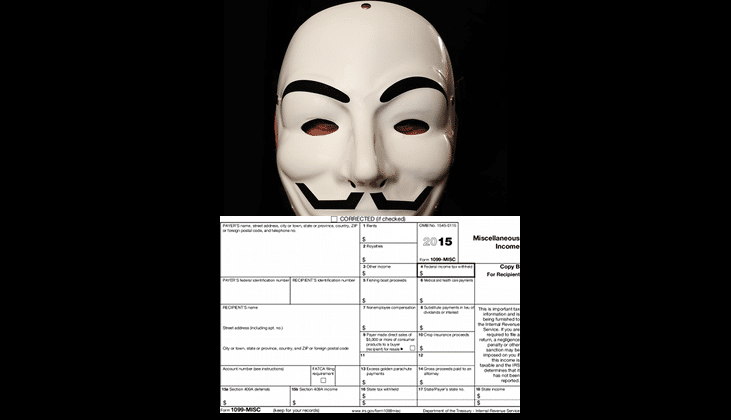
In-brief: Hackers believed to be responsible for a wave of tax identity theft scams got a rude awakening last month: a whopping bill from the IRS. A common mistake in their fraudulent filings appears to be the cause.
Identity thieves believed to be operating from Eastern Europe got an unexpected and unwelcome surprise in their inboxes: a whopping tax bill from Uncle Sam.
The group is believed to be responsible for tens of thousands of fraudulent tax filings using employee information stolen from U.S. firms. However, an apparent error in the fraudulent filings has left the scammers with a whopping debt to the Internal Revenue Service estimated at over $300 million.
“Basically, this is a 1099-misc issue,” said an IRS spokeswoman, referring to the IRS form used to disclose “miscellaneous income.” The spokeswoman asked not to be named, citing an ongoing, internal investigation.
According to the spokeswoman, and others with knowledge of the incident, fraudsters filing the false returns included an additional form declaring what appears to be “miscellaneous” income earned from other nefarious businesses, including ransomware operations. The amounts varied: from $250,000 on one filing to upwards of $17 million on another .
That bit of candor turned out to be expensive. The income earned in the online schemes was all untaxed and – with no evidence of withholding or estimated filings from the faceless hackers – the IRS taxed the income and imposed fines for the scammers failure to withhold.
The tax on that income, plus the fines, pushed the filers into the red. Instead of being entitled to a large refund, they ended up owning the U.S. government money – ranging from tens of thousands of dollars to millions of dollars, per return.
“We screwed up,” wrote a hacker using the handle “LA Gangsta” in an online forum frequented by scammers. “The filer data was golden and the returns were ready to go, but then one of the crew read some blog post about common tax filing mistakes and felt like we needed to make sure we declared all our income. Big (expletive) up.”
Indeed, failing to disclose income is one of the most common tax filing mistakes. In the case of the identity thieves, they would be responsible for income earned within the United States, according to a tax expert. Though income made through illegal schemes like scams, theft and drug dealing is typically not declared, he pointed out. “Just ask Al Capone.”
The group is believed to be responsible for a wave of so-called “phishing” attacks against firms including Arizona-based Sprouts markets and Ryman Hospitality Properties. After posing as company executives and obtaining digital copies of employee W-2 forms, the hackers use automated tools to file thousands or tens of thousands of bogus claims that have led to billions of dollars in fraudulent refund payments.
The problem of fraudulent returns has skyrocketed. In 2014 the IRS received an estimated 150 million tax returns, flagging more than 2 million of those for fraud, totaling more than $15.7 billion. This year, the problem is expected to be worse.
Still, the slip up by the scammers will go some way towards tipping the scales back to level, the IRS spokesman said. “We feel like we do a good job spotting the fraudulent returns, but inevitably some slip through. In this case, we at least feel like we’re going to be able to get some of the money that belongs to the government back.”
As for the scammers, the big tax bill is throwing a shroud over what was supposed to be one of their biggest months of the year.
“Frankly, I’m not sure how we’re going to pay this,” he said of the whopping tax bill. “We didn’t anticipate having to pay any taxes – in fact: we were looking for a big refund.” The additional expense will mean tough decisions about spending in the months ahead, LA Gangsta said. “I mean, we’re hard-working guys. We do well…but not that well!”
